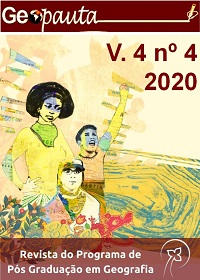Geografía feminista descolonial
DOI:
https://doi.org/10.22481/rg.v4i4.7590Palavras-chave:
Geografia feminista, Descolonialidade, Translocalidade LatinxResumo
Este artigo define a geografia feminista descolonial a partir de uma multiplicidade de lugares. No campo da geografia crítica, escreveu-se mais sobre a descolonialidade de fora do sul global do que dentro de Abya Yala. Uma variedade de geografias críticas, como: geografias negras, geografias indígenas e geografias latinx, coincidem com geografias feministas descoloniais emergentes. A partir de uma personificação da mobilidade e translocação humana, proponho uma definição de geografia feminista descolonial que questiona profundamente os nacionalismos metodológicos e se move em direção a um espaço geográfico imaginário como Abya Yala e Atzlán.
Downloads
Referências
Álvarez Velasco, S. (2020). (In)movilidad en las Américas en tiempos de pandemia. LASA Forum, 5.
Asher, K. (2013). Latin American decolonial thought, or making the subaltern speak. Geography Compass, 7(12), 832-842.
Bayón, M.K., y Torres, N. (2019). Geografía Crítica para detener el despojo de los territorios. Quito, Ecuador: Abya Yala.
Bledsoe, A. (2017). Marronage as a Past and Present Geography in the Americas. Southeastern Geographer, 57(1), 30-50.
Cabnal, L. (2010). Acercamiento a la construcción de la propuesta de pensamiento epistémico de las mujeres indígenas feministas comunitarias de Abya Yala. En ACSUR (Ed.), Feminismos diversos: El feminismo comunitario (pp. 11-25). Las Segovias: ACSUR.
Cabnal, L. (2018). TZK´ AT, Red de Sanadoras Ancestrales del Feminismo Comunitario desde Ixmulew-Guatemala. Ecología Política, (54), 98-102.
Cahuas, M. (2019). Interrogating absences in Latinx theory and placing Blackness in Latinx geographical thought: A critical reflection. Society & Space.
Caretta, M., Zaragocin, S., Turley, T., y Torres, K. (2020). Women´s organizing against extractivism: toward a decolonial multi-sited analysis. Human Geography, 13(1), 49-59.
Colectivo Miradas Críticas del Territorio desde el Feminismo. (2017). Mapeando el cuerpo-territorio: guía metodológica para mujeres que defienden sus territorios. Quito, Ecuador: Colectivo Miradas Críticas del Territorio desde el Feminismo
Cruz, D.T. (2017). A very other gate at the territories-female bodies. Solar, 12(1), 46.
Cruz, V.C. (2017). Geografia e pensamento descolonial: notas sobre um diálogo necessário para a renovação do pensamento crítico. En V.C. Cruz y D. Araújo (Eds.), Geografia e giro descolonial: experiências, ideias e e horizontes de renovação do pensamento crítico (pp. 15-36). Rio de Janeiro, Brasil: Letra Capital.
Daigle, M. (2018). Embodying relations of accountability in settler colonial contexts. Political Geography, 66, 201-203.
Daigle, M., y Ramírez, M.M. (2019). Decolonial geographies En A. Kent, et al. (Eds.), Keywords in Radical Geography: Antipode at 50 (pp. 78-84). Nueva Jersey, Estados Unidos: Wiley-Blackwell.
Daigle, M., y Sundberg, J. (2017). From where we stand: Unsettling geographical knowledges in classroom. Transactions of the Institute of British Geographers, 42(3), 338-341.
Espinosa Miñoso, Y., Gómez Correal, D., y Ochoa Muños, K. (2014). Tejiendo de otro modo: Feminismo, epistemología y apuestas descoloniales en Abya Yala. Popayán, Colombia: Editorial Universidad del Cauca.
Esson, J., Nozolo, P., Baxter, R., Daley, P., y Byron, M. (2017). The 2017 RGS-IBG chair´s theme: decolonizing geographical knolwedges, or reproduction coloniality? Area, 49(3), 384-388.
Faiver-Serna, C. (2019). Juntxs/Together: Building Latinx Geographies. Society & Space.
Friedman, E.F. (2016). Interpreting the Internet. Feminist and Queer Counterpublics in Latin America. Oakland, Estados Unidos: University of California Press.
García Ramón, M.D. (1989). Para no excluir del estudio a la mitad del género humano. Un desafío pendiente en Geografía humana. Boletín de la Asociación de Geógrafos Españoles, (9), 27-48.
Gokariskel, B., Hawkins, M., Neubert, C., y Smith, S. (Forthcoming). Introduction. En B. Görkariksel, et al. (Eds.), Feminist Geography Unbound: Discomfort, bodies and prefigured futures. West Virginia: West Virginia Press.
Haesbaert, R. (2020). Del cuerpo-territorio (de la Tierra): contribuciones decoloniales. Cultura y representaciones sociales, 15(29), 267-301.
Halvorsen, S. (2019). Decolonising territory: Dialogues with Latin American Knowledges and grassroots strategies. Progress in Human Geography, 43(5), 790-814.
Hooker, J. (2017). Theorizing Race in the Americas: Douglass, Sarmiento, Du Bois, and Vasconcelos. Nueva York, Estados Unidos: Oxford University Press.
Hunt, S. (2014). Ontologies of indigeneity: The politics of embodying a concept. Cultural Geographies, 21(1), 27-32.
Jazeel, T. (2017). Mainstreaming geography´s decolonial imperative. Transactions of the Institute of British Geographers, 42(3), 334-37.
Muñoz, L., y Ybarra, M. (2019). Introduction. LatinX Geographies. Space & Society. Recuperado de https://www.societyandspace.org/forums/latinx-geographies
Naylor, L., Daigle, M., Zaragocin, S., Ramírez, M.M.., y Gilmartin, M. (2018). Interventions: Bringing the decolonial to political geography. Political Geography, 66, 199-209.
Paredes, J. (2008). Hilando fino: Desde el feminismo comunitario. La Paz, Bolivia: Cooperativa El Rebozo.
Pulido, L. (2015). Geographies of race and ethnicity 1: White supremacy vs white privilege in environmental racism research. Progress in Human Geography, 39(6), 809-817.
Pulido, L. (2016). Flint, environmental racism and racial capitalism. Capitalism Nature Socialism, 27(3), 1-16.
Pulido, L., y De Lara, J. (2018). Reimagining “justice” in environmental justice: Radical ecologies, decolonial thought, and the Black Radical Tradition. Environment and Planning E: Nature and Space, 0(0), 1-23.
Radcliffe, S. (2005). Development and geography: towards a postcolonial development geography? Progress in Human Geography, 29(3), 291-298.
Radcliffe, S. (2017a). Decolonizing geographical knowledges. Transactions of the Institute of British Geographers, 42(3), 329-333.
Radcliffe, S. (2017b). Geography and Indigeneity I: Indigeneity, coloniality and knowledge. Progress in Human Geography, 41(2), 220-229.
Ramirez, M.M. (2018). Reckoning with decolonial praxis. Political Geography, 66, 204-206.
Ramirez, M.M. (2019). City as borderland: Gentrification and the policing of Black and Latinx geographies in Oakland. Environment and Planning D: Society and Space, 38(1), 147-166.
Silva, J.M., y Ornat, M.J. (2018). Rumo a uma Geografía Feminista Decolonial: entrevista com Sofia Zaragocin-Equador. Latio-americana de Geografía e Género, 9(1), 195-204.
Ulloa, A. (2016). Feminismos territoriales en América Latina: defensas de la vida frente a los extractivismos. Nómadas, (45), 123-139.
Ulloa, A. (2019). Gender and Feminist Geography in Colombia. Gender, Place and Culture: A Journal of Feminist Geography, 26(7-9), 1021-1031.
Veleda Da Silva, S., y Lan, D. (2007). Estudios de geografía del género en América Latina: un estado de la cuestión a partir de los casos de Brasil y Argentina. Documents d’Análisi Geográfica, (49), 9-119.
Wimmer, A., y Schiller, N.G. (2002). Methodological Nationalisms and beyond: nation-state building, migration and the social sciences. The International Migration Review, 37(3), 576-610.
Zaragocin, S. (2018a). Decolonized feminist geopolitics: Coloniality of gender and sexuality at the center of critical geopolitics. En L. Naylor, M. Daigle, S. Zaragocin, M. Ramirez, M. Gilmartin, ‘Interventions: Bringing the Decolonial to Political Geography’. Political Geography.
Zaragocin, S. (2018b). Espacios Acuáticos Desde una Descolonialidad Hemisférica Feminista. Mulier Sapiens, Discurso, Poder, Género, 5(10), 7-19.
Zaragocin, S. (2019a). Gendered Geographies of Elimination: Decolonial Feminist Geographies in Latin American Settler Contexts. Antipode. A Radical Journal of Geography, 51(1), 373-392.
Zaragocin, S. (2019b). Geografía Feminista Descolonial Desde la Colectividad. En M. Bayón, y N. Torres (Eds.), Geografía crítica para detener el despojo de los territorios (pp. 47-56). Quito, Ecuador: Abya Yala.
Zaragocin, S. (Forthcoming). Challenging Anglocentric Feminist Geography from Latin American Feminist Debates on Territoriality In B. Gokariskel, M. Hawkins, C. Neubert, y S. Smith (Eds.), Feminist Geography Unbound. West Virginia: West Virginia Press.
Downloads
Publicado
Como Citar
Edição
Seção
Licença
Copyright (c) 2020 Geopauta

Este trabalho está licenciado sob uma licença Creative Commons Attribution 4.0 International License.
Dos Direitos Autorais
Os autores mantêm os direitos autorais de forma irrestrita e concedem à Geopauta a primeira publicação com o trabalho simultaneamente licenciado em CC BY, que permite que outros compartilhem com reconhecimento da autoria de cada autor na publicação inicial nesta revista.
Propriedade Intelectual e Termos de uso
A Geopauta adota a política de Acesso Livre em Conformidade com o Acesso Aberto- OAC recomendado pelo DOAJ e em conformidade com os Critérios SciELO, sob uma licença Creative Commons CC By Attribution 4.0 International License, permitindo acesso gratuito imediato ao trabalho e permitindo que qualquer usuário leia, baixe, copie, distribua, imprima, pesquise ou vincule aos textos completos dos artigos, rastreie-os para indexação, passe-os como dados para software ou use-os para qualquer outra finalidade legal.
A Geopauta atribui a licença CC BY. onde é permitido sem restrições:
Compartilhar — copiar e redistribuir o material em qualquer suporte ou formato para qualquer fim, mesmo que comercial. desde que lhe atribuam o devido crédito pela criação original.
Adaptar — remixar, transformar, e criar a partir do material para qualquer fim, mesmo que comercial desde que lhe atribuam o devido crédito pela criação original.












